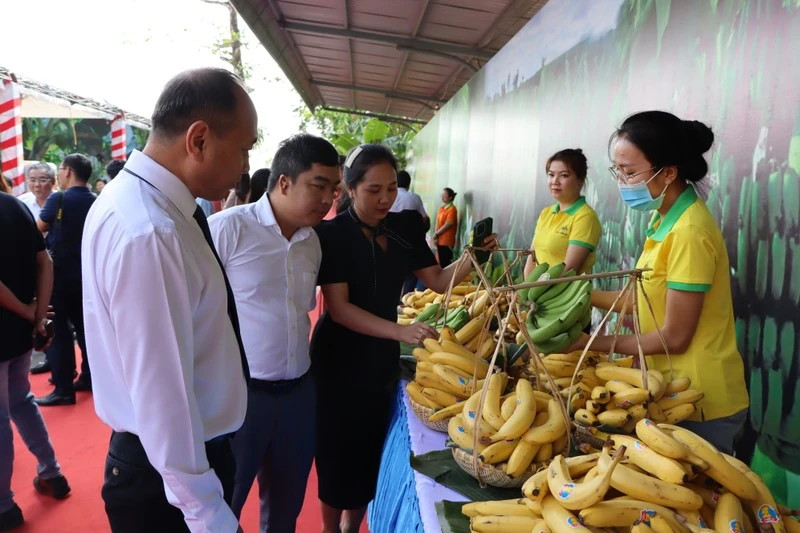Japan remains Vietnam’s third-largest market for agricultural, forestry, and aquatic products, following the United States and China. The export value to Japan accounts for 7.2% of Vietnam’s total exports, marking a significant increase of 29.2% compared to the same period in 2023.
Vietnam currently exports a variety of agricultural products to Japan, including seafood, rice, coffee, and fruits and vegetables. Data from the Institute of Policy and Strategy for Agriculture and Rural Development indicates that in 2023, the export value of certain agricultural products to Japan saw a notable increase.
Specifically, vegetable exports reached 176.2 million USD, vegetable and fruit exports to Japan reached 176.2 million USD, equivalent to 106.7% of that in 2022, and coffee 319 million USD or 114.9%. However, aquatic exports fell 10.9% year on year to more than 1.5 billion USD in 2023, a decrease of 10.9% compared to 2022.
In 2024, it is forecasted that agricultural, forestry, and aquatic exports to Japan will further excel, particularly in the seafood sector. Phung Thi Kim Thu, an expert in the shrimp market at the Vietnam Association of Seafood Exporters and Producers, stated that the Japanese seafood market is considered to have great potential and is expected to recover earlier than other major markets, such as the United States and the European Union in 2024.
She added that this is attributed to Japan's geographical proximity to Vietnam compared to the US and EU, as well as safer payment methods, which are significant advantages for Vietnamese seafood exporters, especially amid continually rising transportation costs. Moreover, Vietnam’s high level of seafood processing capability is a considerable competitive advantage in the Japanese market.
Currently, Vietnamese shrimp dominates the high-end market share in Japan. Compared to other major markets such as the US, EU, and China, the seafood trade with Japan is perceived as more stable. In 2023, Japan ranked second among Vietnam's seafood import markets, only after the US. While exports to the US dropped significantly by 29% and 16-18% to the other top five markets, exports to Japan experienced the lowest decline, at 12%.
In January 2024, Vietnam’s shrimp exports to Japan reached over 37 million USD, a 30% increase compared to the same period in 2023. In the first month of the year, Japan was the third-largest shrimp import market for Vietnam, after the US and China, statistics of the General Department of Customs show. In January 2024, Sao Ta Food Joint Stock Company was the largest shrimp exporter in Japan, accounting for 13.8% of the total value.
A representative of Sao Ta Food Joint Stock Company stated that in 2024, the company will continue to focus on developing in the Japanese market. This strategy aims to leverage its strengths and avoid price wars with Ecuador in the US market. Concentrating on utilizing deep processing strengths and high-quality products has helped the company secure significant orders from Japanese partners.
In addition to aquatic products, coffee is also predicted to be a product with good growth potential in the Japanese market in 2024. According to data from the Japan Coffee Association, compiled by the Coffee Trade Academy (CTA), Japan's green coffee inventory stood at 2.39 million 60-kg sacks at the end of December 2023, 8% lower in the same month a year earlier and also the lowest level of December since 2017. This situation will drive coffee trading activities in Japan in the coming time.
On the other hand, revenue in the Japanese coffee market in 2024 is forecasted to reach around 6.1 billion USD. The growth rate for the period 2024-2028 is estimated at 0.24% per year. In 2024, the average coffee consumption volume is expected to be 1.62 kg per capita, with rising demand for specialty and high-quality coffee in Japan. Therefore, Vietnamese producers and exporters need to pay attention to introducing suitable products to this market to increase their value.
Regarding fruits and vegetables, specifically in January 2024, Vietnam’s fruit and vegetable exports to Japan reached 16.9 million USD, up 40.9% compared to December 2023 and 53.2% compared to January 2023, surpassing the monthly average of 2023 by 2.2 million USD.
Secretary-General of the Vietnam Fruit and Vegetable Association Dang Phuc Nguyen stated Japan’s fruit and vegetable demand is significant, while imports from Vietnam remain relatively low. Thus, there are still many opportunities for Vietnamese fruit and vegetable exporters to expand their market share.
He recommended that businesses should be aware of the regulations of Japan to meet its high standards in order to increase shipments to this market.
















